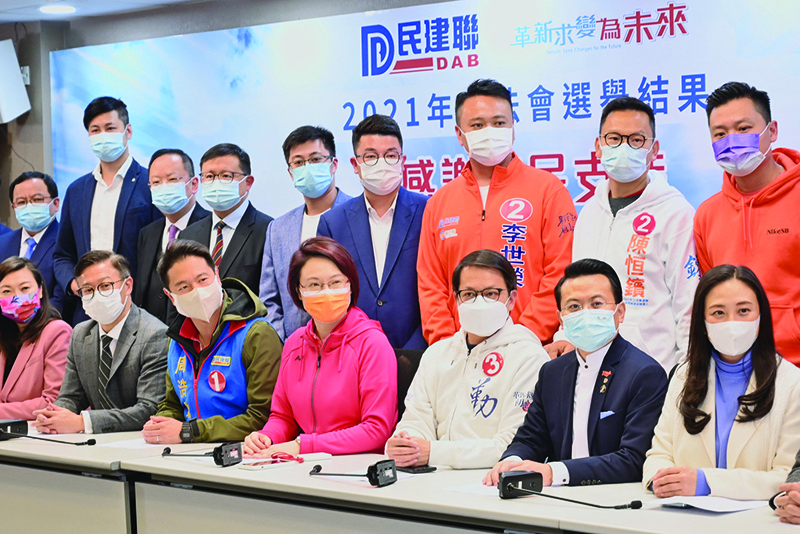HONG KONG: Hong Kong’s leader yesterday hailed the outcome of a "patriots only” legislature election that saw a record low voter turnout and government loyalists sweep every seat. The financial hub selected new lawmakers on Sunday under fresh rules imposed by Beijing that dramatically cut directly elected seats and controlled who could stand for office after huge democracy protests convulsed the city two years ago.
Figures showed just 30 percent of the electorate cast ballots, the lowest rate both of the period since the city’s 1997 handover to China and the British colonial era. Hong Kong’s chief executive Carrie Lam defended the new system and played down the poor turnout. "Hong Kong is now back on the right track of One Country, Two Systems,” she told reporters, naming the model China uses to give the city some autonomy from the authoritarian mainland.
"We cannot copy and paste the so-called democratic system or rules of the Western countries,” she added, arguing the new rules meant "anti-China” elements were now excluded and political calm restored. When asked why only 1.3 million of the 4.5 million registered voters cast ballots, Lam replied: "What is the reason, I can’t analyse. You may need to turn to other opinion leaders.” Zhao Lijian, China’s foreign ministry spokesman, blamed the low turnout on the pandemic and "anti-China elements bent on destroying Hong Kong and the interference of external forces”.
Loyalty vetting
Lam will fly to Beijing on Monday to meet Chinese leaders as focus shifts to whether she will get backing for a second term in March when a 1,500-strong committee stacked with Beijing loyalists will pick the city’s next leader. With her public approval ratings at around 36 percent, Lam has so far declined to say whether she will seek a second term.
Hong Kong has never been a full democracy under either colonial Britain or China, the source of years of protests. Beijing responded to months of huge and often violent rallies in 2019 with a national security law criminalising much dissent and political reforms to remove anyone deemed unpatriotic.
Most of the city’s prominent democracy activists-including many former elected lawmakers-are either in jail, have fled overseas or been disqualified. Alongside screening out "anti-China” activists, directly elected seats were slashed from half to 22 percent. The largest chunk — 40 — were picked by the 1,500-strong Election Committee, which will also choose the city’s next leader.
The remaining 30 were chosen by larger pro-Beijing committees that represent special-interest and industry groups. Only 11 of the 153 candidates who made it through the vetting process were identified as "centrist” or "non-establishment” by local media, but none won enough votes. The result is a legislature stacked with government loyalists similar to the Chinese mainland’s rubber stamp law-making bodies.
"The new Legislative Council, now under the complete control of patriots, will function effectively as the guardian of national security and unity,” Lau Siu-kai, vice-president of Beijing’s top Hong Kong think tank wrote in the state-run China Daily. Analysts warned the new system could leave the city’s rulers even more out of touch with its residents.
"The tension between the authorities and the people will remain in place for a long time while the legislators won’t be mediators because they have to toe Beijing’s line,” said Chung Kim-wah of the Hong Kong Public Opinion Research Institute.
Boycott calls
Hong Kong and Chinese officials had called on residents to embrace Sunday’s polls as a vote of confidence in the new political system. But most Hong Kongers stayed away, taking advantage of free public transport for the day to fill shopping malls, hiking trails and beaches. Turnout at the last legislature polls in 2016 was 58 percent, while the 2019 district council elections, when pro-democracy figures won a landslide, saw a record 71 percent.
The government recently made it illegal to organise or incite voting boycotts but many prominent overseas democracy activists issued such calls online. In the run-up to Sunday, 10 people were arrested under that law. Authorities also issued arrest warrants for overseas activists and threatened Western publications with prosecution for editorials critical of the new political system. — AFP



